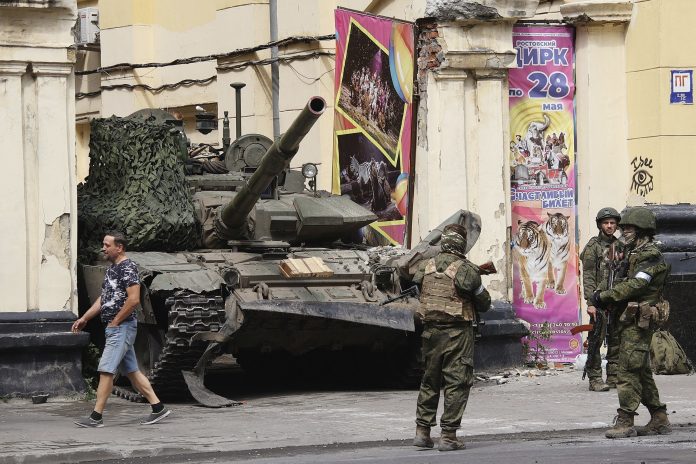
Russia has again thrust itself into the global consciousness and Texas energy experts say a mercenary group leader’s challenge of President Vladimir Putin is good news for American oil and gas producers.
Odessa oilman Kirk Edwards, Waco economist Ray Perryman and 2023 Permian Basin International Oil Show President Larry Richards say Putin has found himself on the ropes since Wagner Group leader Yevgeny Prigozhin’s aborted march on Moscow.
“To me the Russia situation is very intriguing,” Edwards said. “If the war stopped today there would still be major reparations that needed to be done for Ukraine and I think the world would look for Russia and its oil revenue to pay for that in some fashion.
“In the short term, it looks like a slow slog of a war as both sides are not escalating things and there is not much movement either way. Ukraine will keep getting stronger with the backing of the West and that is very positive for them but not for a quick end to the war.”

Edwards said Russia’s internal politics have suddenly become the big unknown.
“The wild card ahead is the political situation inside Russia itself with Putin and his former designated mercenary general Prigozhin and how that all works out,” he said. “There is clearly stress inside Russia and whichever way that goes, so goes the country.
“Either way this bodes well for oil prices to remain where they are or go higher depending upon any damage to Russia’s infrastructure for shipping out both liquefied natural gas and crude oil ahead.”
Perryman said Russia has become more opaque than ever.
“I try, not always successfully, to stay out of geopolitics and stick with economics, but the overlaps are substantial,” he said. “Although it’s hard to tell given the lack of freedom in media coverage, the political situation in Russia does seem to be increasingly unstable with the relationship between Putin and the Wagner Group being clearly complex.
“What’s harder to decipher is the mindset of the general population, military personnel, business and community leaders and others in positions of influence. It is these attitudes that will largely determine the ultimate direction and severity of any conflicts which might arise, but the economic situation will impact attitudes and behavior.”
Perryman said Russian oil and gas will make its way to market one way or another in the near term irrespective of how the immediate internal power struggle and conflicts play out.

“The country has been one of the world’s top exporters of oil and gas and even with the sanctions in place against purchases by many nations, Russia continues to find markets,” he said. “At the same time oil and gas industries comprise a large share of the Russian economy and an even larger proportion of the Russian federal budget.
“With economic incentives of this level, it’s likely that Russia will continue to produce as much oil and gas as possible even if it has to sell them at a discount due to sanctions. The industry will survive for now, partly because Russia can’t afford to let it languish.”
Perryman said Russia faces the challenges of the European Union’s imposition of an effective $60 per barrel price cap and some large purchasers successfully pushing the price even lower with inefficiencies in Russian production making it difficult to profit with the lower prices.
“Moving forward I think many countries will be reluctant to rely on Russian gas even if the situation changes and the Ukrainian situation abates,” he said. “The importance of energy security has been made crystal clear during this conflict and I don’t see European countries and others quickly deciding to back off LNG investments to allow regasification even if greater stability returns.
“When the energy security aspect of importing LNG from the United States or other allies is considered together with the clean-burning characteristics of natural gas compared to fuels such as coal, the incentives to enable the use of LNG are enhanced. As a result I think we will continue to see the development of the LNG industry and a gradual decoupling from Russian dependence.”
Over the longer term, Perryman said, necessity will demand a Russian government that’s able to better mesh with the international community in a manner allowing oil and gas production to occur in an orderly manner conducive to participating in international markets.
“It is hard to see the area being sustainable indefinitely under the current restraints,” he said.
Richards said history suggests that the Russian people and their government’s oil market “may experience very significant disruptions” over the next five to 10 years.
Citing American philosopher Ralph Waldo Emerson (1803-82) Richards said, “When you strike at a king you must kill him.
“It appears that a plot among Prigozhin and two top Russian generals was exposed a few weeks before it was ripe to execute and their short-lived mutiny left the country’s president not only in power but looking for retaliation,” he said. “Leadership changes in Russia have historically included significant bloodshed and many analysts believe the powerful oligarchs and other sharks in Russia smell blood in the water and are quietly circling a leader who appears more vulnerable than most had believed.
“Only time will tell the impact this uncertainty has on global oil and gas markets, but get ready for a bumpy ride.”
Richards said it is fortunate that the European markets that were so reliant on Russian natural gas a decade ago have been very successful in converting to U.S. LNG and other sources.
“As an example Germany completed a massive floating LNG regasification terminal in a record 10-month timeframe last year,” he said. “The U.S. market has invested billions in natural gas pipelines and LNG infrastructure over the past decade from new LNG plants along the Gulf Coast to deepening the channel at Corpus Christi to accommodate the huge-hulled LNG supertankers.
“By super-cooling natural gas into LNG you reduce its volume by 600 times, allowing it to be transported by ship, rail or truck. Import terminals like the new one in Germany are designed to regasify LNG into gaseous form so it can be fed into existing pipeline infrastructure for distribution.
“The biggest impact of falling Russian natural gas exports and use may be seen in the production of synthetic fertilizers made from the ammonia and urea extracted from natural gas, which now feed almost 50 percent of the world’s population. These fertilizers are especially crucial in the drought-prone areas across Africa and the Middle East where disruptions could cause more instability.”
Richards said Russia’s big economic driver has always been its sales of crude oil and if there is a power struggle the top players will fight for control.
“Even with the sanctioned discount on Russian oil, the sums are enormous and many of the producing fields are very remote,” he said. “We could see the Russian government taking over these companies directly to address this threat or see the oligarchs make a real play for power. Either scenario could spell more uncertainty for global oil prices.”



